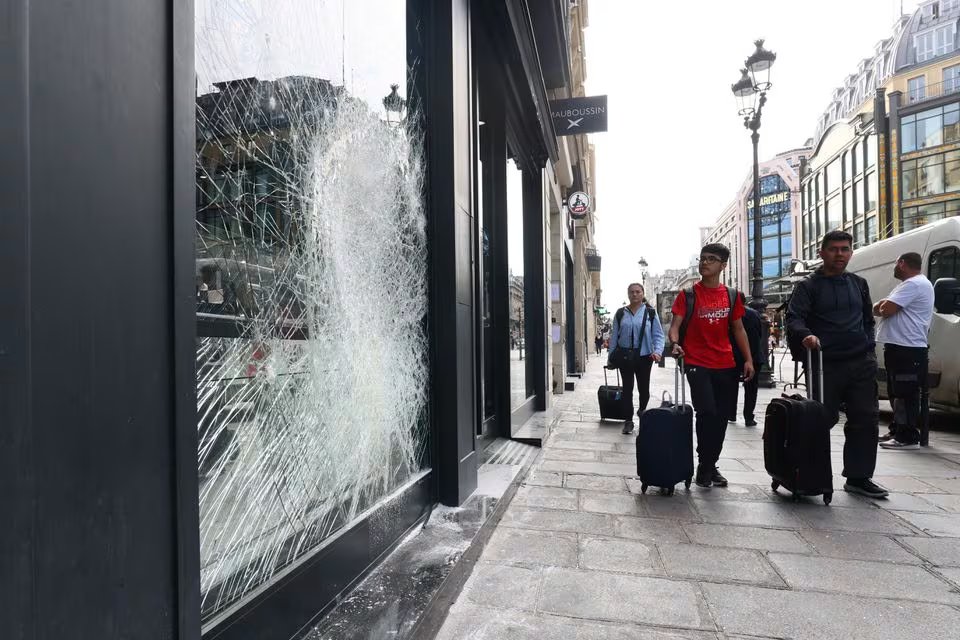France
UN Sees France Shooting As Chance To Tackle Police Racism

Police Racism: The fatal shooting of 17-year-old Nahel by a French police officer during a routine traffic check in Nanterre exposed the country’s law enforcement system’s bigotry. The event, which killed Nahel, highlights France’s historical Black community issues. After this tragedy, the government must confront systematic prejudice in law enforcement contacts with minorities.
Like many countries, France must identify and address institutional racial prejudices. Nahel’s killing highlighted criminal justice system discrepancies for Black people, inciting demonstrations and calls for justice. France should review its law enforcement tactics to promote justice and equality, echoing the UN’s call to end institutional racism.
Police Racism: UN Spokesperson Urges France To Grapple With Racial Discrimination
UN spokeswoman Ravina Shamdasani called on France to address racial discrimination in its law enforcement institutions. Shamdasani said in a press release that Nahel’s death is a sign of systemic issues that need immediate action.
The attention to racism and racial prejudice following this occurrence highlights the need to rethink police procedures and laws. Justice and equality advocates shared Shamdasani’s call for France to address these concerns adequately.
The UN’s focus on law enforcement racial inequities shows the international community’s commitment to holding governments responsible for fair and equitable treatment for all residents.
Importance Of Peaceful Assembly Amidst Growing Tensions
As demonstrations erupted throughout France after Nahel’s murder, the UN rights office stressed the need for peaceful assembly in expressing anger and seeking justice. Police-protester conflicts highlight the tension around racial injustice and police brutality. The call for peaceful assembly is a reminder of the significance of letting folks express their democratic rights while seeking redress.
In these difficult times, the UN’s stress on legality, necessity, proportionality, non-discrimination, prudence, and accountability in regulating actions is crucial. After Nahel’s death, the world watched France struggle to reconcile public order and fundamental rights.
Read Also: UN Criticizes France For Police Violence And Racism Allegations
Beyond Nahel: Illuminating Structural Racism In Policing Practices
While terrible, Nahel’s killing highlights entrenched bias in the police. This case allows for a deeper look at structural prejudices that disproportionately harm Black French people. The country must examine the core causes of law enforcement’s racial inequities, including individual acts and institutional institutions that perpetuate injustice.
Statistics on police-black contacts show discrepancies. From regular traffic stops to serious confrontations, Black people are disproportionately affected. This requires a comprehensive knowledge of how legislation, training, and culture affect Black criminal justice outcomes. By addressing these fundamental concerns, France can make its society more fair and just.
International Perspectives: France’s Role In The Global Fight Against Racism
Nahel’s killing has provoked a national reckoning and attracted worldwide attention to France’s struggle against racism. As an international ambassador, the UN has urged France to address its issues with the same enthusiasm that it promotes international human rights. France can demonstrate its commitment to racial equality inside its borders and as a worldwide justice leader via the incident.
The UN’s participation highlights human rights’ interconnectedness and the necessity for governments to solve internal challenges that affect the world. France’s answer to this appeal for reflection and change will shape its worldwide position and commitment to equality and justice. The occurrence tests France’s position in the global battle against racism and prejudice.
Navigating Accountability: Establishing Trust In Law Enforcement
To regain faith in law enforcement after Nahel’s murder and demonstrations, France must implement accountability measures. Trust between the community and public safety officials is essential to democracy. The UN’s focus on need, proportionality, and accountability in force usage emphasizes transparent and accountable police.
Acknowledging previous complaints and showing responsibility may change. Police training, procedures, and monitoring must be reformed to reflect public concerns. France’s commitment to honesty and responsibility will decide the crisis’s resolution and influence law enforcement’s relationship with communities. Accountability helps France develop a more equitable and inclusive future by repairing trust.
Community Dialogues: Fostering Understanding And Collaboration
Open interactions between law enforcement and their communities are vital to change amid tensions and requests for reform. Community dialogues allow communities, activists, and law enforcement to discuss issues constructively. These talks may go beyond immediate concerns to address structural problems, fostering community and problem-solving.
The UN’s focus on peaceful assembly supports the belief that effective change starts with a conversation. France may organize these meetings to hear varied viewpoints and solve complaints. Involving the community in law enforcement reform may help the country become more inclusive and responsive, establishing a shared responsibility for public safety.
The Role Of Education: Shaping Future Perspectives On Racism
Law enforcement’s deep-seated prejudice may be addressed via education for long-term transformation. Anti-racism teaching in police training and school curricula is crucial to molding future racial equality views. The Nahel tragedy emphasizes the need to confront prejudices at their origins and educate current and future generations to fight structural injustices.
Successful anti-racism education programs worldwide may help promote empathy, understanding, and cultural competency. France may set an example by developing educational programs encouraging diversity, equality, and inclusion in law enforcement and society. France can avoid racial prejudice and discrimination in its institutions by investing in education.
The Imperative For Lasting Reforms
The aftermath of Nahel’s killing highlights the need for sustainable law enforcement changes in France. The UN demand is a response to one occurrence and a call for persistent reform. France must prioritize comprehensive changes that address both the symptoms and causes of law enforcement racial inequality to move ahead.
Policy reforms, community participation, education, and accountability are needed for effective transformation. The UN and the international community will monitor France’s reforms. The next several months will determine the nation’s commitment to a more fair and equal society free from racial prejudice and injustice. France’s reaction to this appeal for enduring change will determine its legacy in the battle against racism and inspire other countries facing comparable issues.












You must be logged in to post a comment Login